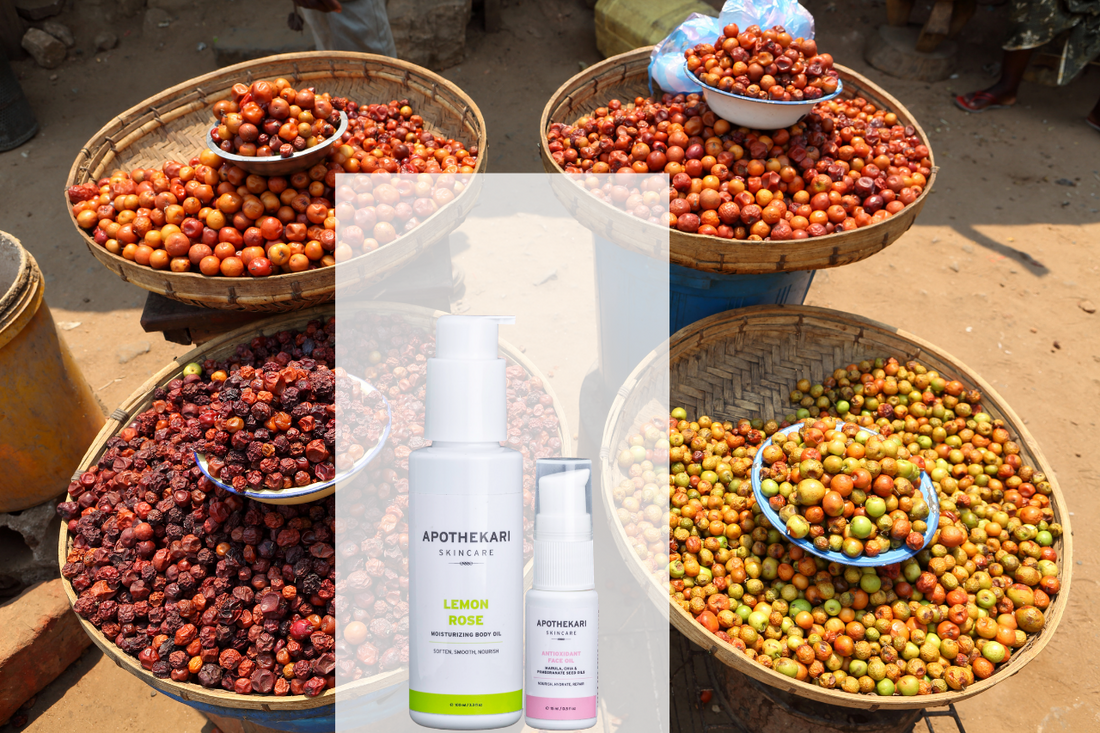Blog
Is Organic Skincare Really Better for You?
If you’re paying closer attention to your health these days, you may be curious whether organic skincare is better. In this post, we’re sharing information that we hope you’ll find useful in making that decision. Read on to learn more. Shop All Apothekari Is Organic Skincare Better? It’s difficult to avoid the claims that organic skincare products are better for your skin, but unfortunately, there’s no evidence to support this. In fact, many organic (along with natural, green, etc) ingredients may be bad for your skin, despite claims that the products are safer or better. This isn’t to say that products made with organic or natural ingredients are terrible, because there are many organic ingredients that are great for your skin. However, just because an ingredient is organic, it doesn’t mean it’s good for skin. And just because it’s synthetic, it doesn’t mean it’s bad for your skin. Natural and/or organic ingredients can be harsh, leading to skin irritation and sensitivities that can get worse over time. This isn’t an issue with organic ingredients only – even synthetic ingredients can be problematic. Ingredients like essential oils, fragrances, harsh cleansers and very low pH or high pH ingredients (like baking soda) may cause skin reactions. On the other hand, there’s also a long list of natural and/or organic ingredients like chamomile, shea butter, some plant oils and turmeric that are great for skin. What to Look For If you’re set on using only organic skincare products, then purchase from reputable companies. These are the ones that know what they are doing – they’re experienced with ingredients and how to incorporate them into safe, stable and effective formulations. They won’t make unsupported and absurd claims. And, they won’t try to frighten you about your skincare choices. The regulations around organic skincare aren’t very clear or strict. Sad, but true, it’s possible that an organic skincare product may contain just one or two organic ingredients. The best way to know that you’re getting what you pay for is to look for certification. Criteria vary depending on the certifying body so get to know them. Organic Skincare Certification Programs The European certifications are most stringent and include: Ecocert Cosmos BDIH UK Soil Association Natrue In the USA, organic cosmetics aren’t regulated by the FDA, rather the USDA program. This means that some organic beauty products are regulated, certified and labeled through the USDA and follow the same certification standards and labeling guidelines as organic food. However, some organic beauty products are certified to independent standards with third-party verification of their ingredients and processing methods. Check to be sure. Whether due to blissful denial or because they don’t know the research, lots of cosmetic companies sell products with ingredients that aren’t really organic or that are a problem for skin. Conversely, just because an ingredient isn’t organic doesn’t mean it’s unsafe or a problem for skin. Let’s set the record straight!
Learn moreDecoding the Beauty Dilemma: Wild Crafted vs. Certified Organic Skincare
In the realm of skincare, the age-old debate persists: Wild Crafted versus Certified Organic. Unraveling the nuances of these terms is crucial for making informed choices about the products that grace your skin. Let’s delve into the intricacies and discern which reigns supreme. SHOP HYDRATING SKIN SET Wild Crafted Unveiled Before the advent of the “Certified Organic” label, there existed a practice known as “Wild Crafted.” This involves the gathering of herbs and plants in their natural habitat, free from herbicides, pesticides, detergents, and other harmful chemicals. Wild Crafted botanicals thrive in the wild, retaining the inherent qualities of plants flourishing in their native surroundings. They embody a genuine, untamed essence. Certified Organic Explored Contrastingly, the Certified Organic designation is bestowed upon herbs and plants cultivated under ideal conditions on farms. The production adheres to stringent standards, ensuring the absence of harmful pesticides, fertilizers, or genetically modified organisms (GMOs). While Certified Organic products are undoubtedly healthy, they may not retain all the characteristics of their wild crafted counterparts due to the controlled farm environment. The Great Debate: Wild Crafted vs. Certified Organic Nutrient Retention Botanicals gathered from the wild, being products of nature’s own design, often retain a broader spectrum of nutrients. The untouched, wild environment allows these plants to develop with all their inherent goodness intact. On the other hand, Certified Organic products, while cultivated under controlled conditions, might not capture the full richness of their wild counterparts. Environmental Impact The choice between Wild Crafted and Certified Organic extends beyond personal benefits to the broader environmental spectrum. Wild Crafted practices, when sustainable, contribute to biodiversity conservation and the preservation of natural habitats. In contrast, Certified Organic farming, though reducing synthetic chemical usage, may still have environmental repercussions. Is Wild the Same as Organic? To address the common query of whether “wild” is synonymous with “organic,” it’s essential to recognize the distinctions between the two. While both Wild Crafted and Certified Organic aim to deliver clean, toxin-free skincare, the methods of cultivation and the environments in which the plants thrive set them apart. The choice between Wild Crafted and Certified Organic depends on individual priorities, whether it be nutrient richness, environmental impact, or personal preferences in skincare. Making an Informed Choice: Our Perspective Apothekari’s Commitment At Apothekari, we recognize that you may find merits in either one or both of Wild Crafted and Certified Organic approaches. The choice is nuanced, and a label isn’t what’s most important. It really comes down to the qualify of ingredients and the formulation itself. Embracing the Diversity of Choices In conclusion, the one isn’t better than the other. Both approaches offer skincare products free from harmful additives, elevating them above commercial-grade alternatives. The choice ultimately lies in personal preferences, environmental considerations, and the desired spectrum of nutrients for your skin. By understanding the intricacies of either wild or certified organic skincare, you can make informed choices that align with your values and skincare goals. The beauty dilemma remains subjective, and the decision becomes a personal journey, echoing the diversity inherent in the world of skincare.
Learn more


